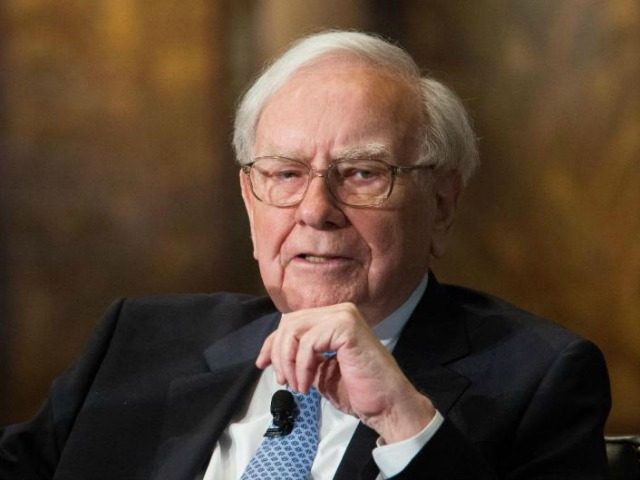Q. What is a tight labor market? A. A tight labor market is when multi-billionaire Warren Buffet is forced to pay higher wages to recruit new employees.
“Railroad workers are being offered signing bonuses of up to $25,000 to join [Buffett-owned] BNSF Railway and Union Pacific Corp. as the freight railroads struggle to fill jobs in a historically tight labor market,” says a report by the Wall Street Journal, which added:
BNSF, owned by Berkshire Hathaway Inc., BRK.A +0.09% has hiring incentives starting at $15,000 for some new hires, according to a document reviewed by The Wall Street Journal.
A BNSF spokeswoman said the railroad is facing a talent shortage across its system and is extending the offer to diesel mechanics, electricians and conductor trainees. “We are constantly evaluating the market and will use this approach when it makes sense to recruit talented individuals for hard to fill positions or locations,” spokeswoman Amy Casas said.
Tight labor markets exist when companies compete for workers by offering high benefits — wages, bonuses, training, easier schedules — that would otherwise flow to management and investors.
Without a tight labor market, workers compete for jobs by accepting lower wages, forgetting about bonuses, giving up on training and accepting painful schedules, while investors, Wall Street, and managers share the savings.
The nation is now near a tight labor market because President Donald Trump is allowing business to grow — and is not giving them a growing extra supply of foreign labor above the one million new legal immigrants and one million guest workers who arrive each year.
The result of Trump’s popular low-immigration/high-wage policy is that expanding business are being forced to compete for workers, first in for the toughest jobs, such as train maintenance in cold-winter regions, far from big cities.
The new payroll costs for Buffett — his net worth is roughly $84 billion — are the flip-side of his support for more cheap-labor immigration and for the amnesty of illegal immigrants. In 2014, he wrote an op-ed for the New York Times backing an amnesty bill as a “sensible plan that would have allowed illegal residents to obtain citizenship.” In 2015, Buffett told Fox News that illegal immigrants “should be able to earn citizenship that are here … I do not think we should deport millions and millions of people.”
Buffett’s rivals in the rail business, Union Pacific, is also being forced to pay higher wages, according to the WSJ:
Union Pacific is offering $10,000 to $20,000 “hiring incentives” to train crews in cities like Denver, Kansas City, Mo., and North Platte, Neb., where its largest rail yard is located. Those jobs average $40,000 in pay over the first year and $60,000 the next, according to job listings. Electricians to inspect, repair and maintain locomotives are being wooed with $25,000 signing bonuses to Union Pacific locations outside Milwaukee; in Hinkle, Ore., a three-hour drive from Portland; and elsewhere.
The combination of Trump’s stronger enforcement push and the growing economy is delivering higher wages and overtime to many employees, including black bakers in Chicago, Latino restaurant workers in Monterey, Calif., disabled people in Missouri, high-schoolers, the construction industry, Superbowl workers, the garment industry, and workers employed at small businesses.
The WSJ also notes that truckers are being paid more to ship materials and goods around the country, saying “Last year, the median salary for long-haul truckload drivers working irregular routes was about $53,000, up 15% compared with 2013, according to the American Trucking Associations, an industry group.”
Every year, 4 million Americans turn 18 and begin looking for good jobs in the free market.
But the federal government inflates the supply of new labor by annually accepting roughly 1.1 million new legal immigrants, by providing work-permits to roughly 3 million resident foreigners, and by doing little to block the employment of roughly 8 million illegal immigrants.
The Washington-imposed economic policy of economic growth via mass-immigration floods the market with foreign labor, spikes profits and Wall Street values by cutting salaries for manual and skilled labor offered by blue-collar and white-collar employees. It also drives up real estate prices, widens wealth-gaps, reduces high-tech investment, increases state and local tax burdens, hurts kids’ schools and college education, pushes Americans away from high-tech careers, and sidelines at least 5 million marginalized Americans and their families, including many who are now struggling with opioid addictions.
Polls show most Americans support Trump’s view of America as a nation of Americans, wrapped in a network of mutual obligations.
Immigration polls which ask people to pick a priority, or to decide which options are fair, show that voters in the polling booth put a high priority on helping their families and fellow nationals get decent jobs in a high-tech, high-immigration, low-wage economy. Those results are very different from the “Nation of Immigrants” polls which are funded by CEOs and progressives, and which pressure Americans to say they welcome migrants.


COMMENTS
Please let us know if you're having issues with commenting.